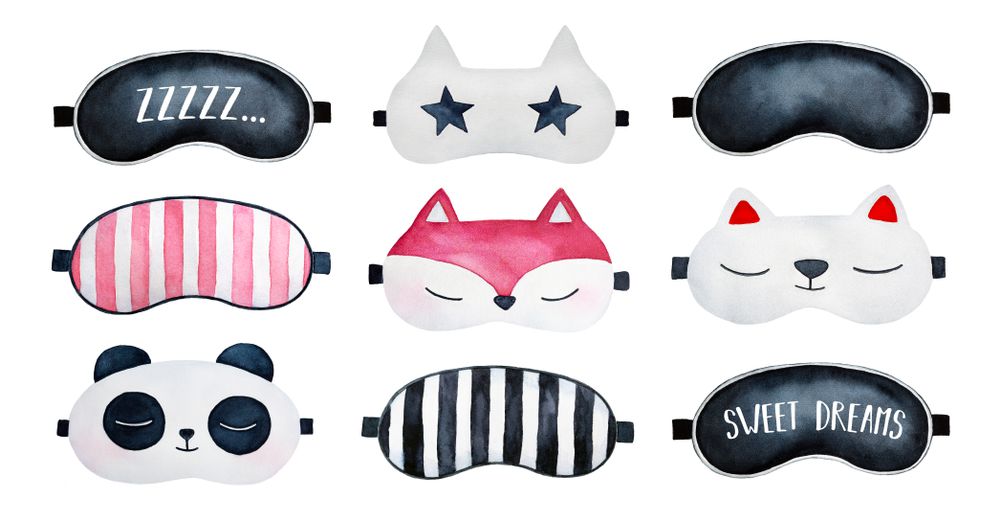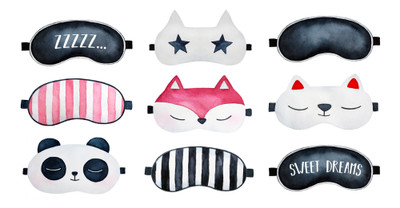"Why You Should Be Using a Sleep Mask Every Single Night" — Shape Magazine
Mask Craft on 11th Jun 2020
 Photo: Shutterstock / Julia August
Photo: Shutterstock / Julia August
These things are the secret to a better night's sleep.
By Colleen Stinchcombe
Pop quiz: What is a contributing factor in both car accidents and heart disease, causes innumerable injuries every year, plays a role in diabetes and depression, and can make you an unproductive grump at work?
It's a lack of sleep. And those aren't random complications we're describing-that's what the Centers for Disease Control (CDC) has linked to poor sleep. (Okay, the unproductive grump is from personal experience.) The problem, the CDC says, is that a third of U.S. adults report getting less sleep than the health organization recommends.
It's a serious issue, which is why it may seem silly that we have one small, simple suggestion that could genuinely help you get a better night's sleep: Wear a sleep mask. (Okay, sleeping naked could help, too.)
Sleep masks aren't just a fashion statement-you can net some serious sleep mask benefits, experts say. All you have to do is block out that ambient light.
Why Blocking Light Is So Important
Although some aspects of how and why we sleep are still a mystery, doctors do have a basic framework for how sleep works. According to the National Heart, Lung, and Blood Institute, there are two processes that heavily influence our desire to sleep. One is a compound called adenosine, which increases in your brain while you're awake and tells your body it's time to sleep when it peaks (before then beginning to break down).
The second process is the "body clock," also known as your circadian rhythm, and light-natural or otherwise-is a major element that helps your body clock figure out whether it's time to be awake or go to sleep. Basically, it works like this: If there's a lot of light flooding in, then your circadian rhythm thinks it's time to be awake, so it suppresses a myriad of chemicals, including big-time player melatonin. A 2011 study in the Journal of Clinical Endocrinology & Metabolismnoted that exposure to light suppressed the onset of melatonin by about 90 minutes-that's a big chunk of time to not be sleeping when you're supposed to be. (Related: Does Getting Enough REM Sleep Really Matter?)
If it's dark, then more melatonin is produced and your circadian rhythm thinks it's time for bed. In addition to making us feel sleepy, "the amount in your body [also] increases as you sleep to push you farther into the sleep cycle," explains Chris Brantner, certified sleep science coach and founder of SleepZoo.
Increased exposure to light could have other consequences, too. A 2017 study in the American Journal of Epidemiology linked nighttime light exposure to depression in elderly people, even when it was adjusted to account for other sleeping parameters. Some experts have even gone so far as to suggest that it's not a lack of sleep we're struggling with, but a lack of darkness. Researchers analyzed sleep patterns in Tanzania, Namibia, and Bolivia, and found that they slept an average of 5.7 hours a night. Despite it being less than what's recommended by the CDC, it seemed to be working for them, and researchers hypothesized it was because they slept in significantly more darkness, without artificial lighting, resulting in better quality sleep. (Related: This Is What a "Good Night's Sleep" Really Means)
Which brings us back to eye masks. If we can't erase modern artificial lighting, are we likely to get any real benefits from sleep masks?
What to Know About Eye Masks
Although sleep experts would still encourage you to put away your phone before bed and not fall asleep watching television, a study published in Critical Carefound that patients in simulated ICU units who wore earplugs and eye masks got more REM sleep and had elevated melatonin levels. So it's no joke that this small, tiny change can have an impact on how we sleep. "Light is one of the primary things we can control to minimize sleep disruption," says Brantner.
So what kind of eye mask should you look for? First, Brantner says you want one that actually blocks light, meaning it needs to properly fit your face. Options that have the nose carved out or that lie flush against your cheek and brow bones may work best. You'll also want to find a fabric that feels comforting to you. Brantner prefers silk, but velvet, faux fur, and fleece are other popular options.
To block out both sound and light, there are also wrap-around eye masks that help muffle noise while you're immersed in total darkness. Pillow-size masks exist too, and they're shaped to rest over your head while still giving you breathing room, smothering ambient light and sounds.
Your sleep mask doesn't have to be purely about shut-eye, either. Companies like NIGHT sell masks with cooling gel inserts to help reduce puffiness, while others sell masks with rounded eye patches so that long-lashed folks don't have to worry about getting their eyelashes smushed.
Even if you don't notice major changes in your sleep habits right away, Alex Dimitriu, M.D., a sleep medicine and psychiatry expert, says you may enjoy the mask anyway. "There's something also very soothing about having a soft mask over the eyes, [and it] can have a calming effect for some," he adds.
So yes, with all these sleep mask benefits at your disposal, you should definitely embrace the glamour. Your body will thank you for it.
By Colleen Stinchcombe






